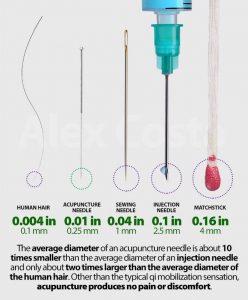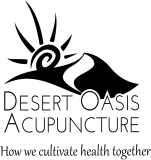A:While some techniques can be a bit more painful than others, most patients feel little or no discomfort during the treatment. Acupuncture needles are solid filiform, slightly thicker than the hair on your head, needles that are very small. Also, acupuncture needles are not hollow like hypodermic needles, so the process is much less painful than getting an injection at the doctor’s office. See the difference below.
A: Desert Oasis Acupuncture is currently an in network provider with UnitedHealthCare, Humana, Molina, and Triwest. We keep trying to get in with Presbyterian, BCBS, and True Health. You can help by calling or writing to your insurance provider and saying add Desert Oasis Acupuncture to your list of providers.
A: Acupuncture involves the insertion of small needles in certain parts of the body along particular lines of energy called “meridians.” The needles release energy blockages and stimulate your body’s natural healing capacities to relieve pain and address both mental and physical health conditions at a system-wide level.
Acupuncture has been used in China and other parts of Eastern Asia for thousands of years and is one of the most central treatment tools of Traditional Chinese Medicine. Other treatment techniques that may be used during your treatment include: Tui Na, which is Chinese massage focusing on specific acupressure points; Cupping, in which suction cups are placed on the skin, pulling up the skin and fascia to facilitate the body’s natural detoxification and circulation processes; and Moxibustion which involves the burning of a stick of mugwort near the skin to bring warmth and circulation to injured or painful areas. Chinese Medicine also includes the prescription of various herbs blended to address your specific health issues.
For a great overview of how acupuncture works, watch the video below.
Acupuncture has been used in China and other parts of Eastern Asia for thousands of years and is one of the most central treatment tools of Traditional Chinese Medicine. Other treatment techniques that may be used during your treatment include: Tui Na, which is Chinese massage focusing on specific acupressure points; Cupping, in which suction cups are placed on the skin, pulling up the skin and fascia to facilitate the body’s natural detoxification and circulation processes; and Moxibustion which involves the burning of a stick of mugwort near the skin to bring warmth and circulation to injured or painful areas. Chinese Medicine also includes the prescription of various herbs blended to address your specific health issues.
For a great overview of how acupuncture works, watch the video below.
A: Some of them can, just like grapefruit can. But here at Desert Oasis Acupuncture we won’t prescribe any that will.
A: The frequency of treatment largely depends on the condition. In terms of preventative care acupuncture can be immensely helpful and should be performed monthly. Community-style acupuncture can make this really affordable. Acute injuries or illness often should be treated at least weekly if not multiple times in a week. Once the acute phase is over treatment time can be scaled back. Treatment schedules for chronic conditions will vary greatly based on the condition.
A: A healthy spiritual life can be part of the “wholeness” of being healthy, acupuncture itself does not require a specific religious belief.
A recent academic review of the highest level of medical research shows that Acupuncture has been proven effective for:
– Allergies (perennial & seasonal)
– Chemotherapy-induced nausea
– Chronic low back pain
– Headaches and Migraines
– Knee pain
– Post-operative pain
– Depression
– Menopausal symptoms
– Insomnia
– Anxiety
– PTSD
– Constipation
– Obesity
– Restless Leg Syndrome
For more information on this study, see
The Acupuncture Evidence
This NIH article explains how acupuncture elicits some of its effects
Growth Control Theory of Acupuncture
– Allergies (perennial & seasonal)
– Chemotherapy-induced nausea
– Chronic low back pain
– Headaches and Migraines
– Knee pain
– Post-operative pain
– Depression
– Menopausal symptoms
– Insomnia
– Anxiety
– PTSD
– Constipation
– Obesity
– Restless Leg Syndrome
For more information on this study, see
The Acupuncture Evidence
This NIH article explains how acupuncture elicits some of its effects
Growth Control Theory of Acupuncture
A: There sure are. Full disclosure these are links to books on amazon of which i get 4.5% of the sale price. All proceeds go towards subsidizing acupuncture for those who can’t afford it.
